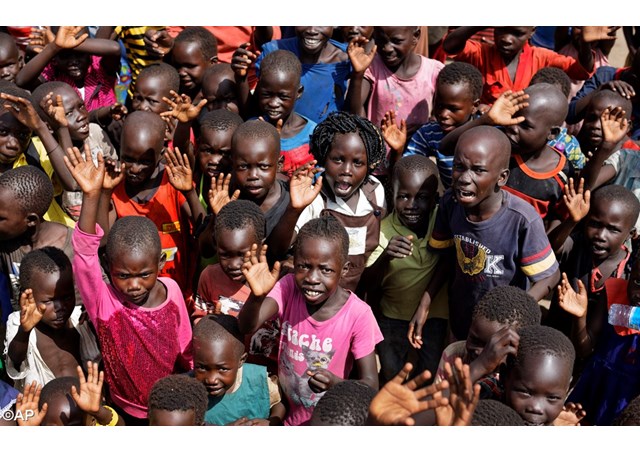
Ugandan Radio Pacis providing hope to South Sudan's refugees

(Vatican Radio) Over a million South Sudanese refugees, who've fled across the border with Uganda, are struggling for survival in one of the world’s largest humanitarian crises.
South Sudan, which gained independence from its northern neighbour in 2011, spiraled into civil war after President Salva Kiir fired his vice president and rival, Riek Machar, two years later.
A regionally mediated peace agreement, signed in 2015, failed within months and since then over a third of the population has fled from the violence that has spread across the country.
Italian Comboni missionary, Fr Tonino Pasolini, has spent the past half century in Uganda, currently serving as media director for Arua diocese on the border with South Sudan and the Democratic Republic of Congo. He founded and runs Radio Pacis, a multi-lingual radio station bringing a message of peace and reconciliation, as tensions between the refugees and the local population continue to rise.
Fr Tonino talked to Philippa Hitchen about what his radio station is trying to do to support all those caught up in this forgotten refugee crisis…
Listen:
Fr Tonino explains that Radio Pacis began 13 years ago with just one frequency, but soon added another to cope with the many local languages used throughout the region. Recently a third frequency has been opened in Gulu and the radio currently reaches more than 10 million people, including listeners across the border in the DRC and Southern Sudan.
He notes that since July 2016, the influx of South Sudanese to Arua diocese has been at a rate of 4.000 a day. The refugees walk for days through the bush, for fear of being killed by the army or rebels on the roads and many die along the way.
UNHCR doing 'wonderful job'
New arrivals, Fr Tonino says, are picked up by the UNHCR that is “doing a wonderful job”, despite a severe shortage of funds. They are taken to camps where they are screened, registered, and given a jerry can, a basin, a hoe, some blankets and some poles to build a shelter for the night.
Though there has been some much-needed rain in the region, Fr Tonino continues, many refugees are going hungry and there are also growing tensions with local residents, who have been very generous in supporting the new arrivals. But over a million have arrived in the past year, he says, 86 percent of them women and children: what is their future, he asks?
Local Church support for refugees
The local Caritas is doing what it can to support the refugees, funded by donors in Europe, Fr Tonino says, but the numbers are “overwhelming”. Some missionaries have also come from South Sudan to support their people in the settlements.
Radio Pacis also provides a vital contribution by spreading a message of hope and helping people to recognize that “unless each refugee becomes a peace maker, reconciling him or herself with neighbors from other tribes, there will be no peace in South Sudan”.
Message of peace and reconciliation
Through a weekly roundtable programme called 'Community Voices', Fr Tonino says, the radio can also help Ugandans understand the plight of the refugees and be more ready to welcome them.
Asked why there is no media attention to this crisis, Fr Tonino says he believes that “Italy or other countries in Europe have no economic interest in Uganda or South Sudan, so why care for those people?” While it is “painful to hear, here in Italy, about migrants arriving”, he reflects, the numbers “are very few in comparison” but “nobody talks about that”.
Visit by Pope Francis and Archbishop of Canterbury
Finally Fr Tonino shares his hopes for a planned visit by Pope Francis and the Archbishop of Canterbury Justin Welby to South Sudan, which was postponed due to a lack of security guarantees. “The only way would be to come and visit refugees in northern Uganda” he says, but such as visit would help to capture media attention, just as a visit by the new UN Secretary General did a few months ago.
Through the presence of these two leaders, he says, people might talk about this issue “so that international community would do something”. Otherwise, he says, no one within South Sudan at the moment seems able “to develop reconciliation and peace between these two peoples”.
| All the contents on this site are copyrighted ©. |


